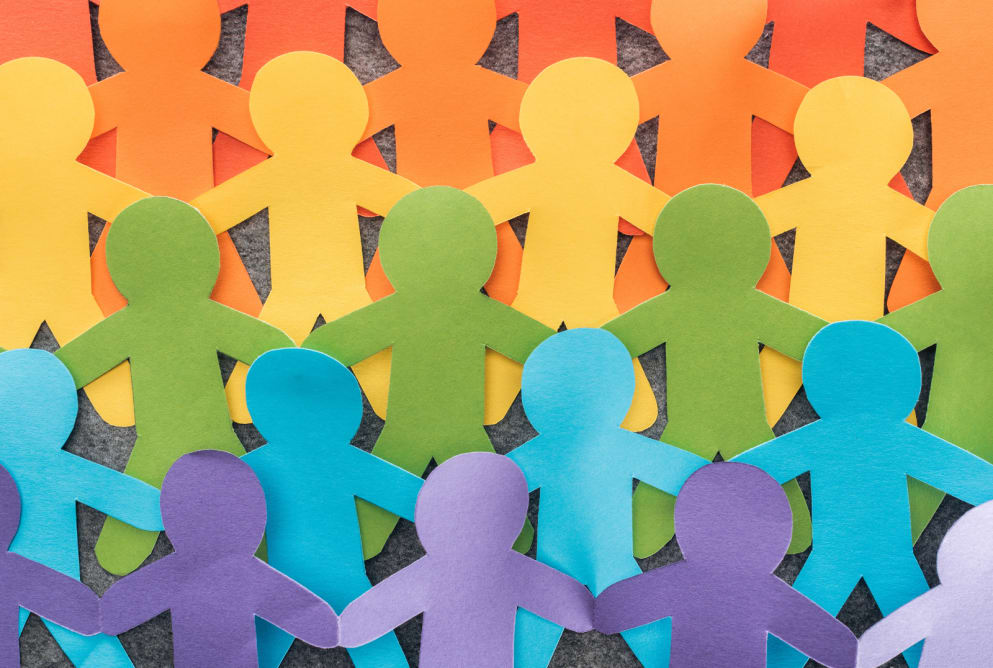February marks LGBTQ+ History Month, a time to recognise the achievements of LGBTQ+ people, as well as the challenges they face within society.
Homelessness is one of those challenges.
Across the UK, a disproportionate number of LGBTQ+ young people are facing homelessness, and dealing with discrimination and intolerance as they seek to secure a more positive future. You can read more about the crisis here.
At Simon on the Streets, we’re using this month to reflect on the current LGBTQ+ housing crisis, and what we can do to make a change.
LGBTQ+ young people and homelessness
According to research, young people who are part of the LGBTQ+ community are at a disproportionate risk of homelessness. In fact, they account for approximately 24% of those who are facing life on the streets, or struggling with other forms of ‘hidden’ homelessness.
But why is this the case?
What are the causes of the LGBTQ+ homelessness crisis?
There are many reasons why LGBTQ+ young people are facing homelessness, and unfortunately no universal, one-size-fits all solution. In order to make a change, it’s important for everyone to have an awareness and understanding of the specific challenges they face.
Let’s take a look.
Family rejection and discrimination
Amongst LGBTQ+ people, family rejection is a leading, and very distressing, cause of homelessness. Statistics show that 77% of LGBTQ+ young people facing homelessness after coming out or being outed, and that only 13% of the LGBTQ+ youth feeling supported by family members whilst facing homelessness.
Without the support of family and friends, LGBTQ+ young people are increasingly vulnerable, and it’s clear that there’s a need for wider and more robust and reliable support networks.
A higher risk of violence and abuse
Studies have shown that LGBTQ+ young people are more at risk of violence and abuse, not only whilst sleeping rough, but also when sofa surfing and placed in temporary accommodation.
The inequalities go further than that, with LGBTQ+ young people also being more likely to fall victim to:
- Substance abuse
- Sexual violence and exploitation
- Risky sexual behaviour
Unsuitable temporary accommodation
Whilst temporary placements and hostels can be a lifeline for many, that’s not to say they’re always fit for purpose. Many LGBTQ+ young people report feeling unrepresented, unsafe and discriminated against, with some accommodation providers being unable to recognise and support the diversity of need.
What steps do we need to take in order to make a change?
The various causes contributing to LGBTQ+ homelessness inevitably have a number of devastating consequences.
Whatever form it takes, those dealing with homelessness are more likely to face challenges when it comes to their health and wellbeing, accessing education and employment, and having the strength and confidence to face the future - all of which are serious barriers to positive change.
In addition, because of the obvious inequalities, LGBTQ+ young people are far less likely to access support services, meaning that we’ll never truly know the extent of the problem.
There are a number of things that we as a society, including the government, need to consider putting into practice if we want to live in a fairer and more inclusive society. For example:
- Creating clear guidance around supporting LGBTQ+ young people as and when they access support services
- Providing adequate training for support service staff about the diverse needs of the LBGTQ+ community
- Considering ways in which hostels and temporary accommodation can become safer spaces for those in the LGBTQ+ community who are facing homelessness
- Investing in more affordable social housing
Here at Simon on the Streets, we understand that homelessness poses unique challenges for each individual, and that no one person’s experience is the same. That’s why we’re always out there, raising awareness and providing support to those who need it the most.
No one should be forced to choose between who they are and the risk of facing homelessness, and there’s still a long way to go in terms of progress when it comes to tackling inequality and discrimination. However, with your help, we can continue to make a difference.
To find more information about how you can support the work of Simon on the Streets, simply visit our website or get in touch.
